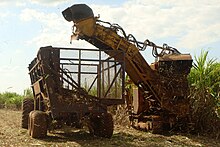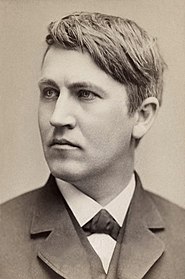Portal:Energy
| Main page | New articles & Tasks |
 The Energy Portal Welcome to Wikipedia's Energy portal, your gateway to energy. This portal is aimed at giving you access to all energy related topics in all of its forms.
|
Page contents: Selected article • Selected image • Selected biography • Did you know? • General images • Quotations • Related portals • Wikiprojects • Major topics • Categories • Help • Associated Wikimedia |
Introduction
Energy (from Ancient Greek ἐνέργεια (enérgeia) 'activity') is the quantitative property that is transferred to a body or to a physical system, recognizable in the performance of work and in the form of heat and light. Energy is a conserved quantity—the law of conservation of energy states that energy can be converted in form, but not created or destroyed; matter and energy may also be converted to one another. The unit of measurement for energy in the International System of Units (SI) is the joule (J).
Forms of energy include the kinetic energy of a moving object, the potential energy stored by an object (for instance due to its position in a field), the elastic energy stored in a solid object, chemical energy associated with chemical reactions, the radiant energy carried by electromagnetic radiation, the internal energy contained within a thermodynamic system, and rest energy associated with an object's rest mass.
All living organisms constantly take in and release energy. The Earth's climate and ecosystems processes are driven primarily by radiant energy from the sun. The energy industry provides the energy required for human civilization to function, which it obtains from energy resources such as fossil fuels, nuclear fuel, renewable energy, and geothermal energy. (Full article...)
Selected article

The history of ethanol fuel in Brazil dates from the 1970s and relates to Brazil's sugarcane-based ethanol fuel program, which allowed the country to become the world's second largest producer of ethanol, and the world's largest exporter. Several important political and technological developments led Brazil to become the world leader in the sustainable use of bioethanol, and a policy model for other developing countries in the tropical zone of Latin America, the Caribbean, and Africa. Government policies and technological advances also allowed the country to achieve a landmark in ethanol consumption, when ethanol retail sales surpassed 50% market share of the gasoline-powered vehicle fleet in early 2008. This level of ethanol fuel consumption had only been reached in Brazil once before, at the peak of the Pró-Álcool Program near the end of the 1980s. (Full article...)
Selected image

Photo credit: Björn Appel
A solar furnace can be used to generate electricity, melt steel or make hydrogen fuel.
Did you know?

- The 1,222 km long Nordstream pipeline between Russia and the Germany is the world's longest underwater pipeline?
- Due to the vast quantity of coal burnt in fossil fuel power plants, they cause more radioactive contamination than nuclear power plants?
- Chinese energy policy includes using renewable energy for the rural electrification of 3.5 million households by 2010?
- The 354 MW SEGS solar power plant (pictured) in the Mojave Desert is the world's largest?
- Known reserves of petroleum are typically estimated at around 1.2 trillion barrels, or at 3.74 trillion barrels if oil sands are included?
- The concentration of the greenhouse gas carbon dioxide has increased from about 280 parts per million to about 380 ppm since the start of the Industrial Revolution. That's an increase of 35.71%. The estimated population of the world in 1750 was 791 Million people. The estimated population of the world on June 30th, 2007 was 6.6 Billion people. That's an increase of 734.39%.?
- In the 1990s Bougainville conflict, islanders cut off from oil supplies due to a blockade used coconut oil to fuel their vehicles?
- The Organization of the Petroleum Exporting Countries (OPEC) is considered a cartel by many observers?
Selected biography
Edison invented the first commercially practical electric light bulb which, by 1879 would burn for hundreds of hours. He was able to sell the concept to homes and businesses by mass-producing them and creating a complete system for the generation and distribution of electricity.
Edison patented an electric distribution system in 1880, and in January 1882 he switched on the first steam generating power station at Holborn Viaduct in London, UK. The direct current (DC) supply system provided electricity supplies to street lamps and a number of private dwellings within a short distance of the station. The first investor-owned electric utility, Pearl Street Station, New York City, started generating on September 4, 1882, providing 110 volts direct current to 59 customers in lower Manhattan.
Life magazine (USA), in a special double issue, placed Edison first in the list of the "100 Most Important People in the Last 1000 Years," noting that the light bulb he promoted "lit up the world." He was ranked thirty-fifth on Michael H. Hart's list of the most influential figures in history.
In the news
- 30 September 2024 – Coal phase-out
- The last coal-fired power station in the United Kingdom shuts down in Ratcliffe-on-Soar, Nottinghamshire, England, ending the 142-year history of coal-fired electricity in the UK. (The Guardian)
- 20 September 2024 – Ukraine–European Union relations
- President of the European Commission Ursula von der Leyen announces a loan of up to €35 billion (US$39 billion) for Ukraine in military and energy support following Ukrainian President Volodymyr Zelenskyy's drafting of a new victory plan against Russia. (Reuters)
- 18 September 2024 – Israel–Hezbollah conflict
- Several home solar energy systems explode in Beirut, Lebanon. (ABC News)
General images
Quotations
- "The world's second-largest emitter of greenhouse gases is China. Yet, China was entirely exempted from the requirements of the Kyoto Protocol. India and Germany are among the top emitters. Yet, India was also exempt from Kyoto." – George W. Bush, 2001
- "The newly industrialized States cannot, for example, be asked to apply restrictive environmental standards to their emerging industries unless the industrialized States first apply them within their own boundaries." – Pope John Paul II, 1990
- "We should work together to make sure the international community upholds the goals and framework established in the United Nations Framework Convention on Climate Change and its Kyoto Protocol and the principle of common but differentiated responsibilities." – Hu Jintao, 2007
Related portals
WikiProjects
WikiProjects connected with energy:
Other WikiProjects that may be of interest:
Major topics
Major categories
National energy supply, use & conservation
National electricity sector
Politics, economics, environment
- Climate change
- Energy conservation
- Energy economics
- Energy crises
- Energy development
- Energy policy
- Peak oil
Energy sources
- Fuels
- Biofuels
- Fossil fuels
- Fusion power
- Nuclear technology
- Renewable energy
- Energy conversion
- Electric power
- Energy storage
Energy-related design
Scientific usage
Help

Puzzled by energy?
Can't answer your question?
Don't understand the answer?
- Ask at the reference desk
- Read the Wikipedia help pages
For further ideas, to leave a comment, or to learn how you can help improve and update this portal, see the talk page.
Associated Wikimedia
The following Wikimedia Foundation sister projects provide more on this subject:
-
Commons
Free media repository -
Wikibooks
Free textbooks and manuals -
Wikidata
Free knowledge base -
Wikinews
Free-content news -
Wikiquote
Collection of quotations -
Wikisource
Free-content library -
Wikiversity
Free learning tools -
Wiktionary
Dictionary and thesaurus



























































































































































































